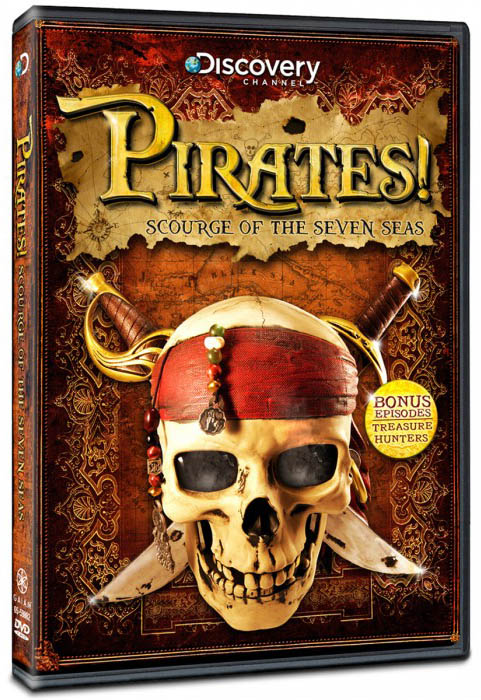
A TWO-HOUR FILM blending solid research and credible dramatizations, Pirates: Scourge of the Seven Seas (Discovery Channel/Windfall Films, $14.95) takes an engaging voyage beyond legend and entertainment into the world of history. It explores how the seafaring brigands of early modern Europe invented or honed asymmetric naval warfare and new forms of democracy: how they developed social welfare programs, such as pooled funds from which to compensate wounded pirates for lost eyes and limbs: and even how they faced off against the navies of empires.
Featuring seadogs like Sir Francis Drake, the Elizabethan era marked the dawn of piracy’s great age. Leave it to the English, Protestant incubators of modern capitalism, to transform piracy into something with the patina of respectability. England’s primary enemy, feudal Catholic Spain, fed its overwhelming might on wealth streaming across the oceans from the New World. How to tap (and sap) those lifelines without risking broad conflict? Commission pirates with “letters of marque” that entitled the Crown to a share of the take. Then rename them “privateers” and ask investors to fund their excursions. Call it deniability.
Drake was the ur-privateer—an ambitious social climber and masterful sailor. In 1578 he dared the treacherous Straits of Magellan, rounded South America’s tip, and plundered along its relatively unguarded west-coast ports, loading in gold and silver bound for Madrid. A superb naval tactician, he decimated the opposition with his well-armed flagship, the Golden Hind. Then he circumnavigated the globe to get home. His profits were staggering: Queen Elizabeth’s share financed her government for a year.
Time changes everything, however. A century later, when the British Empire’s trade routes ringed the globe, it was the Royal Navy’s turn to try to suppress piracy. Ironically, as Pirates slyly notes, the navy fostered its nemesis thanks to impressment—the seizure of men and boys to serve on navy ships—which stoked rebellion and escape. Those clever or fast or brutal enough to get out frequently turned to piracy, as payback but also to live a better, freer life—at least compared with the navy’s inhuman treatment and almost certain death.
There’s plenty more genuine booty here, as history replaces folklore with facts. Colorful figures like Blackbeard and William Kidd and pirate queen Anne Bonny take turns onscreen.
Piracy’s tactics and strategies are examined: the advantages and drawbacks of various ships, the use of flotillas, the weaponry, the methods of boarding vessels. DVD bonus: two swashbuckler-driven episodes of the Discovery Channel series MythBusters, and two of the NBC reality show Treasure Hunters.
Gene Santoro is a New York–based writer and reviewer.

